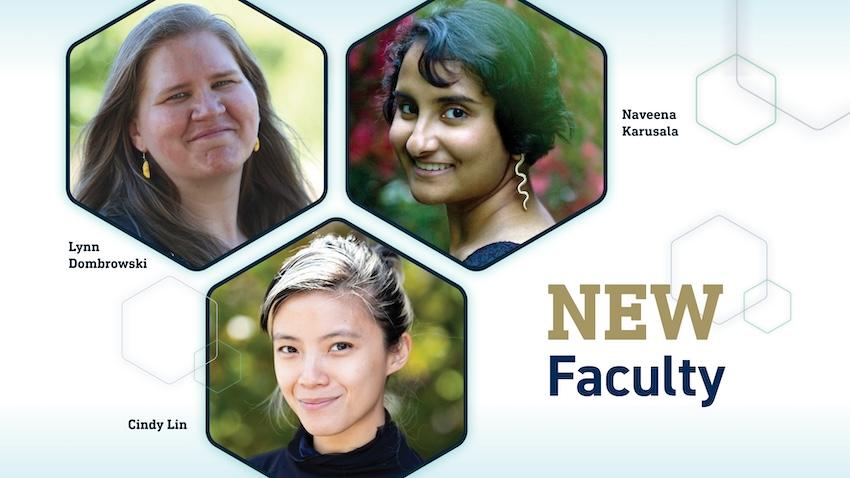
Three New Faculty Look to Advance School's Responsible Computing Agenda
As the fall semester approaches, the School of Interactive Computing welcomes three new members to its interdisciplinary faculty.
Naveena Karusala, Cindy Lin, and Lynn Dombrowski will begin their new roles as IC faculty this month.
“I am delighted to have these accomplished scholars join our faculty,” said Shaowen Bardzell, chair of the School of Interactive Computing. “Naveena, Cindy, and Lynn have expertise in various computing research areas. They will provide intellectual leadership and energy in human-centered AI, algorithmic decision-making in healthcare, climate justice, and future of work. They will enrich our students’ academic experiences and help advance our school’s responsible computing research agenda to create a positive societal impact.”
Karusala is a Georgia Tech alumna (CS 2016) and received her Ph.D. in computer science from the University of Washington. Her research investigates how care work can be centered in designing AI technologies to create sustainable futures for work in healthcare and social services.
Karusala serves as vice president for communications on the executive committee of the Association of Computing Machinery’s (ACM) Special Interest Group on Computer-Human Interaction (SIGCHI).
Karusala said she is excited to return to Atlanta because it is the ideal venue to continue her research.
“There are many institutions that work on public health challenges, and the city is amid conversations around whether and how we can use emerging technology like AI to serve the public interest,” she said. “And of course, I’m happy to be a Yellow Jacket again.”
Lin is an ethnographer and information scientist originally from Singapore. She earned her bachelor’s in Southeast Asian Studies at the National University of Singapore and her Ph.D. in information from the Information School at the University of Michigan, where she won the ProQuest Distinguished Dissertation Award.
Lin said she became interested in how climate change affected her neighboring countries —Malaysia and Indonesia — and how AI technology tracks and mitigates wildfires.
“My research shows that the environment is far from a static landscape predisposed to manipulation and control by AI,” Lin said. “Instead, it highlights how our rapidly changing climate has altered the design and development of AI applications and, consequently, our understanding of the environment.”
At Georgia Tech, Lin hopes to develop a global, interdisciplinary network of researchers to critically examine the connections between AI and climate change.
She said, “As governments worldwide increasingly rely on data for managing the environment, I hope this network can amplify the similarities and differences of how climate change impacts their communities.
“That way, we can begin to unpack the hype around AI, as either a force for replacing labor or an existential risk to humanity. We should understand its practice and impact are not universal or inevitable, but specific to place, time, and people.”
Dombrowski comes to the School of Interactive Computing as an associate professor. She joins Georgia Tech following nine years at the School of Informatics at Indiana University-Purdue University at Indianapolis (IUPUI). In 2022, she became the School of Informatics’ HCI Program Director.
Dombrowski’s research contributes to human-computer interaction, ubiquitous and social computing, and design. She uses design and empirical methods to explore how computing technologies can address social inequity.
Her current research focuses on marginalized communities, particularly low-wage service workers, and how sociotechnical methods can improve their conditions.
“Part of the mission of this area of human-computer interaction is to deepen and sustain momentum on how to apply sociotechnical thinking toward design,” Dombrowski said. “I want to work and think alongside folks about the kinds of futures we want and how to achieve them through sociotechnical computing methods. I hope to collaborate with local groups and continue to sustain and invigorate my research.”
Dombrowski will move her Just Design Lab from IUPUI to Georgia Tech, where students will use empirical, design, and theoretical approaches to explore the boundaries of sociotechnical systems in pursuit of social justice.
As computing revolutionizes research in science and engineering disciplines and drives industry innovation, Georgia Tech leads the way, ranking as a top-tier destination for undergraduate computer science (CS) education. Read more about the college's commitment:… https://t.co/9e5udNwuuD pic.twitter.com/MZ6KU9gpF3
— Georgia Tech Computing (@gtcomputing) September 24, 2024


